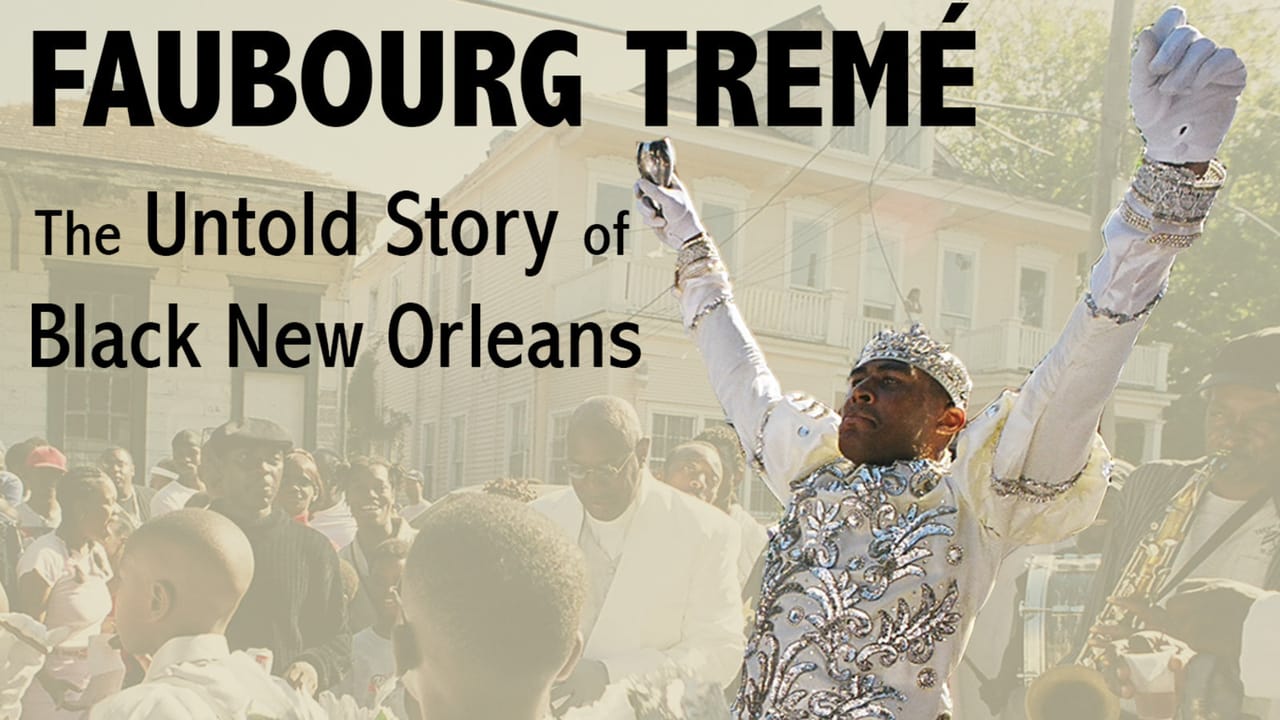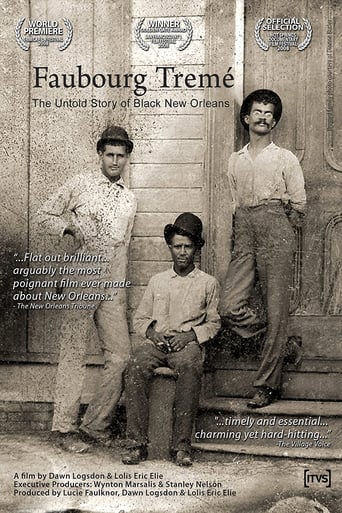

This was a wonderfully engaging and well-researched film. Faubourg Treme was home to the largest community of Free Black People in the Deep South and the birthplace of jazz. The filmmakers did a fabulous job of uncovering the lost history of this unique American city. It explains how blacks were treated different in this town when the Spanish and then the French owned Louisiana until it was sold by Napoleon to the United States. Slaves and Free People of Color were influenced by the French and Haitian revolutions and it helped fuel the civil rights movement of the 1800s. Yes, New Orleans was different then the rest of the South. Blacks could go to school, sue their masters for back wages, own slaves themselves. Like the poet said. None of the history books talk about New Orleans. African American history has been simplified. "Black people were slaves. Period. Then came civil war. Period. Then came the freedom. Period." This film explains that it was much more than that. The spirit and perseverance of the people of New Orleans comes through every frame of the film. The music and dancing scenes are especially beautiful as is the way the filmmakers treat their interview subjects. Some of it is heartbreaking. What a struggle these poor people have had before and after Reconstruction, Jim Crow, the fight for during the second civil rights movement to desegregate the schools (again!) and then the devastating blow by the flood after Katrina . Great drama and entertaining, but also highly recommended for anyone interested in American history, Black History, the roots of jazz, civil rights, sociology and so much more.
... View MoreEveryone should watch this film - young and old. If you want to really understand the history behind the HBO Treme series, you should see this film. You can see where David Simon and Eric Overmyer got their ideas and inspiration. They use the same old home movie shots this documentary uses and the family photos for the end credits are very much the same as HBOs opening sequence with the same John Boutte song. This is an inspiring film. I see why they wanted to emulate it so much. The history is eye-opening. I didn't know half that stuff and I thought I new my American history. I liked the re-enactments, the characters are real and moving. Glen David Andrews and the carpenter are my favorite characters. Wynton Marsalis' interview is really good, too. Go Treme.
... View MoreI'd never heard of this documentary or the director...but I bought it on a whim online (www.tremedoc.com) recently because I've been reading all about the upcoming HBO series Treme and my newspaper cited this documentary as essential viewing in preparation for the series - to learn more about the area. They weren't kidding. This show totally blew me away. I feel like my understanding of jazz, history and my country have been turned upside down. Can't wait to watch the HBO show tonight to see how they handle the subject. Glad I watched the real story before the fiction one started. The real story is about a community that has survived unbelievable hardships and given America unbelievable gifts. The most famous of those is jazz. But there are so many more completely unknown and forgotten gifts. I don't want to spoil it by spelling out each one. See the show yourself! You won't regret it.
... View MoreFAUBOURG TREMÉ: THE UNTOLD STORY OF BLACK NEW ORLEANS is a relevant and well-crafted movie that respects long-gone, recent and current residents. The film informs viewers of the locale's unique history, providing glimpses of the neighborhood's twists and turns. The Tremé is culturally and historically rich. It is also the U.S.'s oldest African-American enclave. This was news to me -a native of Harlem, a somewhat similar locale that is also (at a slower pace) experiencing massive change. As a resident of New York City, a coastal city that seeks to avoid Hurricane Katrina-like scenarios, I find the film's geography extremely relevant. The filmmakers clearly love the Tremé. At a recent screening, the audience and I were taught a lot in an entertaining manner. Someone sitting in my row actually wrote 7 pages of notes. We were all led to feel deeply about the people the film introduced us to. Accompanying such passion for its subjects, a big part of the movie's audience-engrossing power is cinematic craft. The movie shapes much at first glance, unrelated- material into something that is educational, has narrative threads, and is moving.Viewers could have been presented a hum-drum or even blurry juggling act. However, images shown in FAUBOURG TREMÉ are sharp; transitions between portrayed figures and eras, handled deftly. Period re-enactment tour guides, a home-restoration effort, exuberant mourning rituals, and the trivia-relegated Plessy v. Ferguson Supreme Court case all receive screen time. So does a well-known natural disaster -Hurricane Katrina. Reacting to the outrageously callous (and/or inept) government response, a library of Katrina related material is growing. Portrayals prompt almost push-button shock, anger and remorse. Everyone SHOULD be riled up by unnecessarily endured and poorly relieved suffering. However, a few of the news clips, documentaries and agitprop I've seen overemphasize Katrina survivor victim-hood and powerlessness; some presentations do so to the point of almost celebrating pathology. These depict traumatized folk as one-dimensional, not quite human, and as lacking history, pre-disaster vigor and sense of agency. FAUBOURG TREMÉ is no mere reaction to presidential/FEMA-failure. It succeeds because its creators take their subjects, the audience and film-making seriously. Seeing the movie was worth the time and money that I, a father of preschool children, spent but typically hoard. I plan to share the film with my children when they are a little older. See this film; encourage your schools, libraries and public television stations to obtain and screen it.
... View More